Characteristics of Successful Businessmen
VerifiedAdded on 2020/10/22
|14
|3827
|207
AI Summary
This assignment provides an in-depth examination of the characteristics that make a businessman successful. It highlights the importance of risk-taking and innovative skills in entrepreneurship and discusses the role of small business in contributing to economic growth. The report draws from various sources, including books and journals, and online resources, providing a comprehensive understanding of this topic.
Contribute Materials
Your contribution can guide someone’s learning journey. Share your
documents today.

ENTREPRENEURSHIP AND SMALL
BUSINESS DEVELOPMENT
BUSINESS DEVELOPMENT
Secure Best Marks with AI Grader
Need help grading? Try our AI Grader for instant feedback on your assignments.
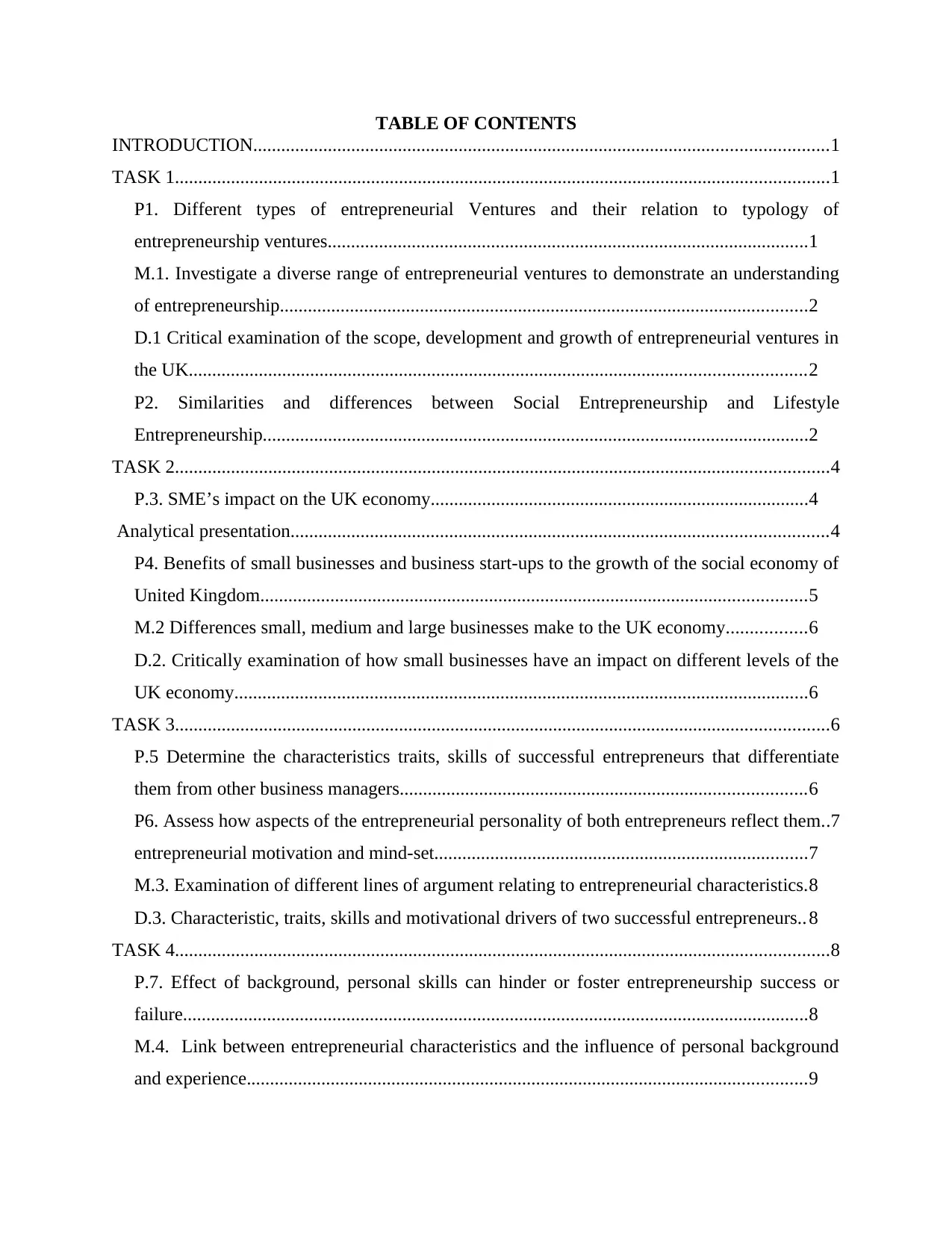
TABLE OF CONTENTS
INTRODUCTION...........................................................................................................................1
TASK 1............................................................................................................................................1
P1. Different types of entrepreneurial Ventures and their relation to typology of
entrepreneurship ventures.......................................................................................................1
M.1. Investigate a diverse range of entrepreneurial ventures to demonstrate an understanding
of entrepreneurship.................................................................................................................2
D.1 Critical examination of the scope, development and growth of entrepreneurial ventures in
the UK....................................................................................................................................2
P2. Similarities and differences between Social Entrepreneurship and Lifestyle
Entrepreneurship.....................................................................................................................2
TASK 2............................................................................................................................................4
P.3. SME’s impact on the UK economy.................................................................................4
Analytical presentation...................................................................................................................4
P4. Benefits of small businesses and business start-ups to the growth of the social economy of
United Kingdom.....................................................................................................................5
M.2 Differences small, medium and large businesses make to the UK economy.................6
D.2. Critically examination of how small businesses have an impact on different levels of the
UK economy...........................................................................................................................6
TASK 3............................................................................................................................................6
P.5 Determine the characteristics traits, skills of successful entrepreneurs that differentiate
them from other business managers.......................................................................................6
P6. Assess how aspects of the entrepreneurial personality of both entrepreneurs reflect them..7
entrepreneurial motivation and mind-set................................................................................7
M.3. Examination of different lines of argument relating to entrepreneurial characteristics.8
D.3. Characteristic, traits, skills and motivational drivers of two successful entrepreneurs.. 8
TASK 4............................................................................................................................................8
P.7. Effect of background, personal skills can hinder or foster entrepreneurship success or
failure......................................................................................................................................8
M.4. Link between entrepreneurial characteristics and the influence of personal background
and experience........................................................................................................................9
INTRODUCTION...........................................................................................................................1
TASK 1............................................................................................................................................1
P1. Different types of entrepreneurial Ventures and their relation to typology of
entrepreneurship ventures.......................................................................................................1
M.1. Investigate a diverse range of entrepreneurial ventures to demonstrate an understanding
of entrepreneurship.................................................................................................................2
D.1 Critical examination of the scope, development and growth of entrepreneurial ventures in
the UK....................................................................................................................................2
P2. Similarities and differences between Social Entrepreneurship and Lifestyle
Entrepreneurship.....................................................................................................................2
TASK 2............................................................................................................................................4
P.3. SME’s impact on the UK economy.................................................................................4
Analytical presentation...................................................................................................................4
P4. Benefits of small businesses and business start-ups to the growth of the social economy of
United Kingdom.....................................................................................................................5
M.2 Differences small, medium and large businesses make to the UK economy.................6
D.2. Critically examination of how small businesses have an impact on different levels of the
UK economy...........................................................................................................................6
TASK 3............................................................................................................................................6
P.5 Determine the characteristics traits, skills of successful entrepreneurs that differentiate
them from other business managers.......................................................................................6
P6. Assess how aspects of the entrepreneurial personality of both entrepreneurs reflect them..7
entrepreneurial motivation and mind-set................................................................................7
M.3. Examination of different lines of argument relating to entrepreneurial characteristics.8
D.3. Characteristic, traits, skills and motivational drivers of two successful entrepreneurs.. 8
TASK 4............................................................................................................................................8
P.7. Effect of background, personal skills can hinder or foster entrepreneurship success or
failure......................................................................................................................................8
M.4. Link between entrepreneurial characteristics and the influence of personal background
and experience........................................................................................................................9

D.4. Critically evaluate how personal background and experience influences entrepreneurs.9
CONCLUSION................................................................................................................................9
REFERENCES..............................................................................................................................10
CONCLUSION................................................................................................................................9
REFERENCES..............................................................................................................................10
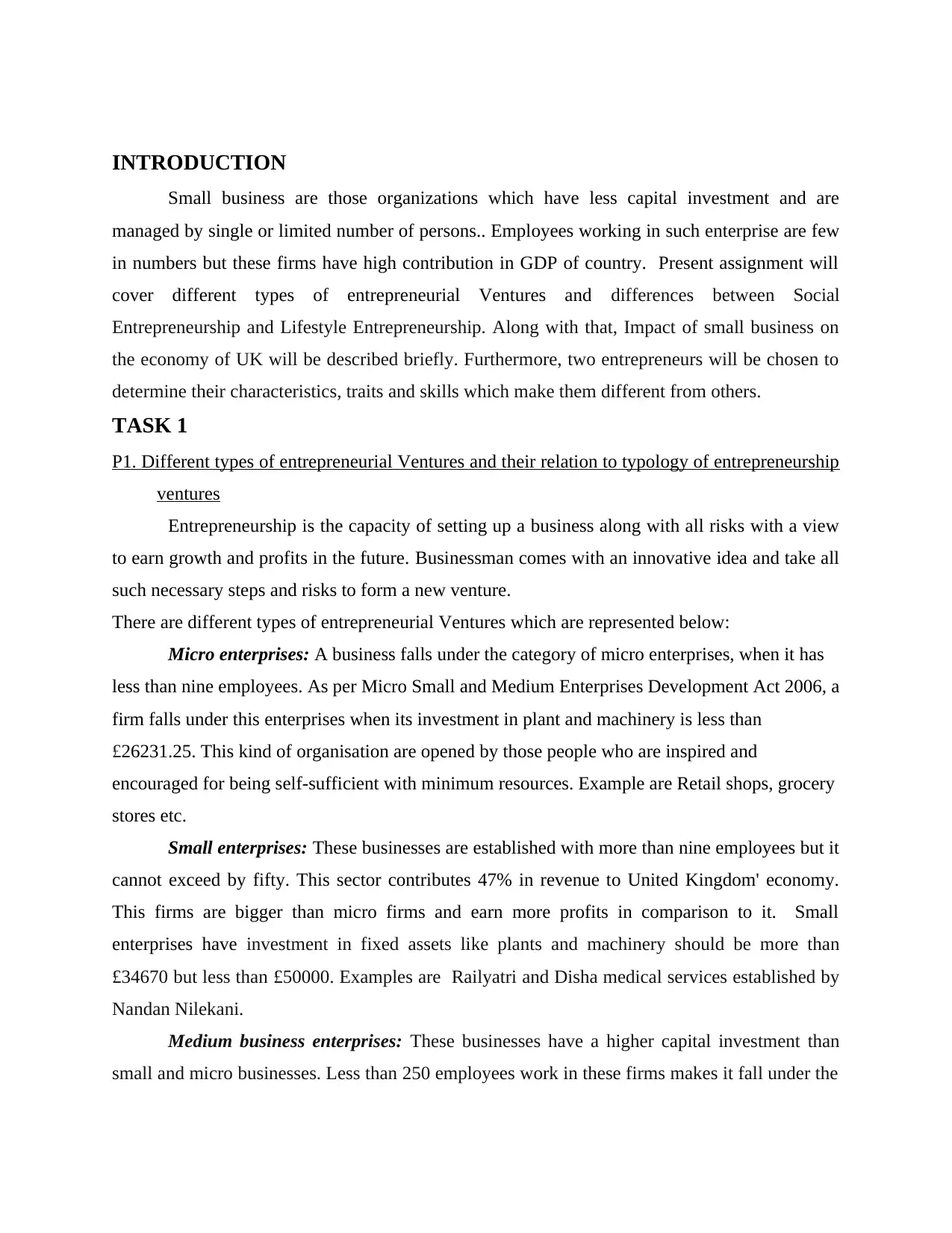
INTRODUCTION
Small business are those organizations which have less capital investment and are
managed by single or limited number of persons.. Employees working in such enterprise are few
in numbers but these firms have high contribution in GDP of country. Present assignment will
cover different types of entrepreneurial Ventures and differences between Social
Entrepreneurship and Lifestyle Entrepreneurship. Along with that, Impact of small business on
the economy of UK will be described briefly. Furthermore, two entrepreneurs will be chosen to
determine their characteristics, traits and skills which make them different from others.
TASK 1
P1. Different types of entrepreneurial Ventures and their relation to typology of entrepreneurship
ventures
Entrepreneurship is the capacity of setting up a business along with all risks with a view
to earn growth and profits in the future. Businessman comes with an innovative idea and take all
such necessary steps and risks to form a new venture.
There are different types of entrepreneurial Ventures which are represented below:
Micro enterprises: A business falls under the category of micro enterprises, when it has
less than nine employees. As per Micro Small and Medium Enterprises Development Act 2006, a
firm falls under this enterprises when its investment in plant and machinery is less than
£26231.25. This kind of organisation are opened by those people who are inspired and
encouraged for being self-sufficient with minimum resources. Example are Retail shops, grocery
stores etc.
Small enterprises: These businesses are established with more than nine employees but it
cannot exceed by fifty. This sector contributes 47% in revenue to United Kingdom' economy.
This firms are bigger than micro firms and earn more profits in comparison to it. Small
enterprises have investment in fixed assets like plants and machinery should be more than
£34670 but less than £50000. Examples are Railyatri and Disha medical services established by
Nandan Nilekani.
Medium business enterprises: These businesses have a higher capital investment than
small and micro businesses. Less than 250 employees work in these firms makes it fall under the
Small business are those organizations which have less capital investment and are
managed by single or limited number of persons.. Employees working in such enterprise are few
in numbers but these firms have high contribution in GDP of country. Present assignment will
cover different types of entrepreneurial Ventures and differences between Social
Entrepreneurship and Lifestyle Entrepreneurship. Along with that, Impact of small business on
the economy of UK will be described briefly. Furthermore, two entrepreneurs will be chosen to
determine their characteristics, traits and skills which make them different from others.
TASK 1
P1. Different types of entrepreneurial Ventures and their relation to typology of entrepreneurship
ventures
Entrepreneurship is the capacity of setting up a business along with all risks with a view
to earn growth and profits in the future. Businessman comes with an innovative idea and take all
such necessary steps and risks to form a new venture.
There are different types of entrepreneurial Ventures which are represented below:
Micro enterprises: A business falls under the category of micro enterprises, when it has
less than nine employees. As per Micro Small and Medium Enterprises Development Act 2006, a
firm falls under this enterprises when its investment in plant and machinery is less than
£26231.25. This kind of organisation are opened by those people who are inspired and
encouraged for being self-sufficient with minimum resources. Example are Retail shops, grocery
stores etc.
Small enterprises: These businesses are established with more than nine employees but it
cannot exceed by fifty. This sector contributes 47% in revenue to United Kingdom' economy.
This firms are bigger than micro firms and earn more profits in comparison to it. Small
enterprises have investment in fixed assets like plants and machinery should be more than
£34670 but less than £50000. Examples are Railyatri and Disha medical services established by
Nandan Nilekani.
Medium business enterprises: These businesses have a higher capital investment than
small and micro businesses. Less than 250 employees work in these firms makes it fall under the
Secure Best Marks with AI Grader
Need help grading? Try our AI Grader for instant feedback on your assignments.
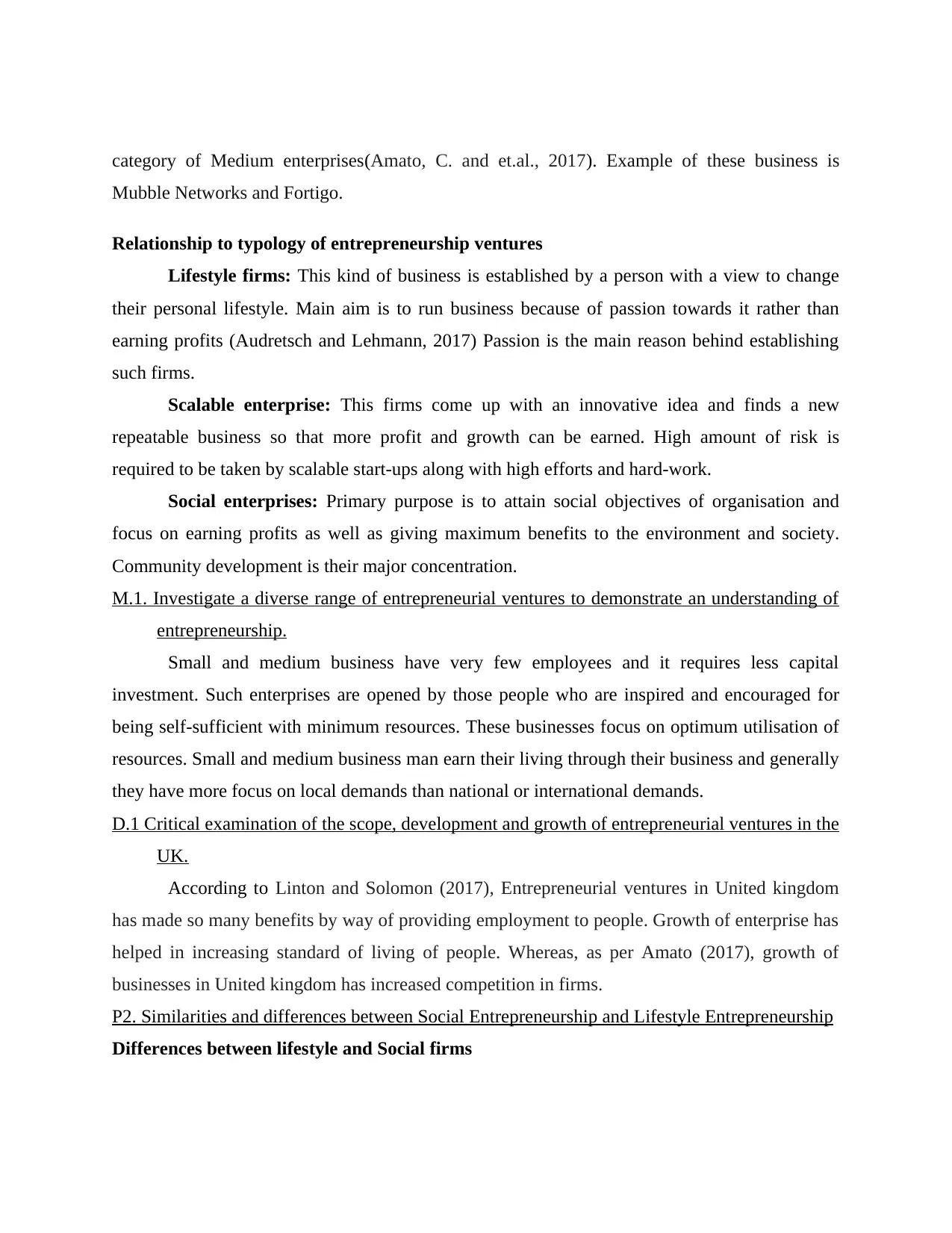
category of Medium enterprises(Amato, C. and et.al., 2017). Example of these business is
Mubble Networks and Fortigo.
Relationship to typology of entrepreneurship ventures
Lifestyle firms: This kind of business is established by a person with a view to change
their personal lifestyle. Main aim is to run business because of passion towards it rather than
earning profits (Audretsch and Lehmann, 2017) Passion is the main reason behind establishing
such firms.
Scalable enterprise: This firms come up with an innovative idea and finds a new
repeatable business so that more profit and growth can be earned. High amount of risk is
required to be taken by scalable start-ups along with high efforts and hard-work.
Social enterprises: Primary purpose is to attain social objectives of organisation and
focus on earning profits as well as giving maximum benefits to the environment and society.
Community development is their major concentration.
M.1. Investigate a diverse range of entrepreneurial ventures to demonstrate an understanding of
entrepreneurship.
Small and medium business have very few employees and it requires less capital
investment. Such enterprises are opened by those people who are inspired and encouraged for
being self-sufficient with minimum resources. These businesses focus on optimum utilisation of
resources. Small and medium business man earn their living through their business and generally
they have more focus on local demands than national or international demands.
D.1 Critical examination of the scope, development and growth of entrepreneurial ventures in the
UK.
According to Linton and Solomon (2017), Entrepreneurial ventures in United kingdom
has made so many benefits by way of providing employment to people. Growth of enterprise has
helped in increasing standard of living of people. Whereas, as per Amato (2017), growth of
businesses in United kingdom has increased competition in firms.
P2. Similarities and differences between Social Entrepreneurship and Lifestyle Entrepreneurship
Differences between lifestyle and Social firms
Mubble Networks and Fortigo.
Relationship to typology of entrepreneurship ventures
Lifestyle firms: This kind of business is established by a person with a view to change
their personal lifestyle. Main aim is to run business because of passion towards it rather than
earning profits (Audretsch and Lehmann, 2017) Passion is the main reason behind establishing
such firms.
Scalable enterprise: This firms come up with an innovative idea and finds a new
repeatable business so that more profit and growth can be earned. High amount of risk is
required to be taken by scalable start-ups along with high efforts and hard-work.
Social enterprises: Primary purpose is to attain social objectives of organisation and
focus on earning profits as well as giving maximum benefits to the environment and society.
Community development is their major concentration.
M.1. Investigate a diverse range of entrepreneurial ventures to demonstrate an understanding of
entrepreneurship.
Small and medium business have very few employees and it requires less capital
investment. Such enterprises are opened by those people who are inspired and encouraged for
being self-sufficient with minimum resources. These businesses focus on optimum utilisation of
resources. Small and medium business man earn their living through their business and generally
they have more focus on local demands than national or international demands.
D.1 Critical examination of the scope, development and growth of entrepreneurial ventures in the
UK.
According to Linton and Solomon (2017), Entrepreneurial ventures in United kingdom
has made so many benefits by way of providing employment to people. Growth of enterprise has
helped in increasing standard of living of people. Whereas, as per Amato (2017), growth of
businesses in United kingdom has increased competition in firms.
P2. Similarities and differences between Social Entrepreneurship and Lifestyle Entrepreneurship
Differences between lifestyle and Social firms
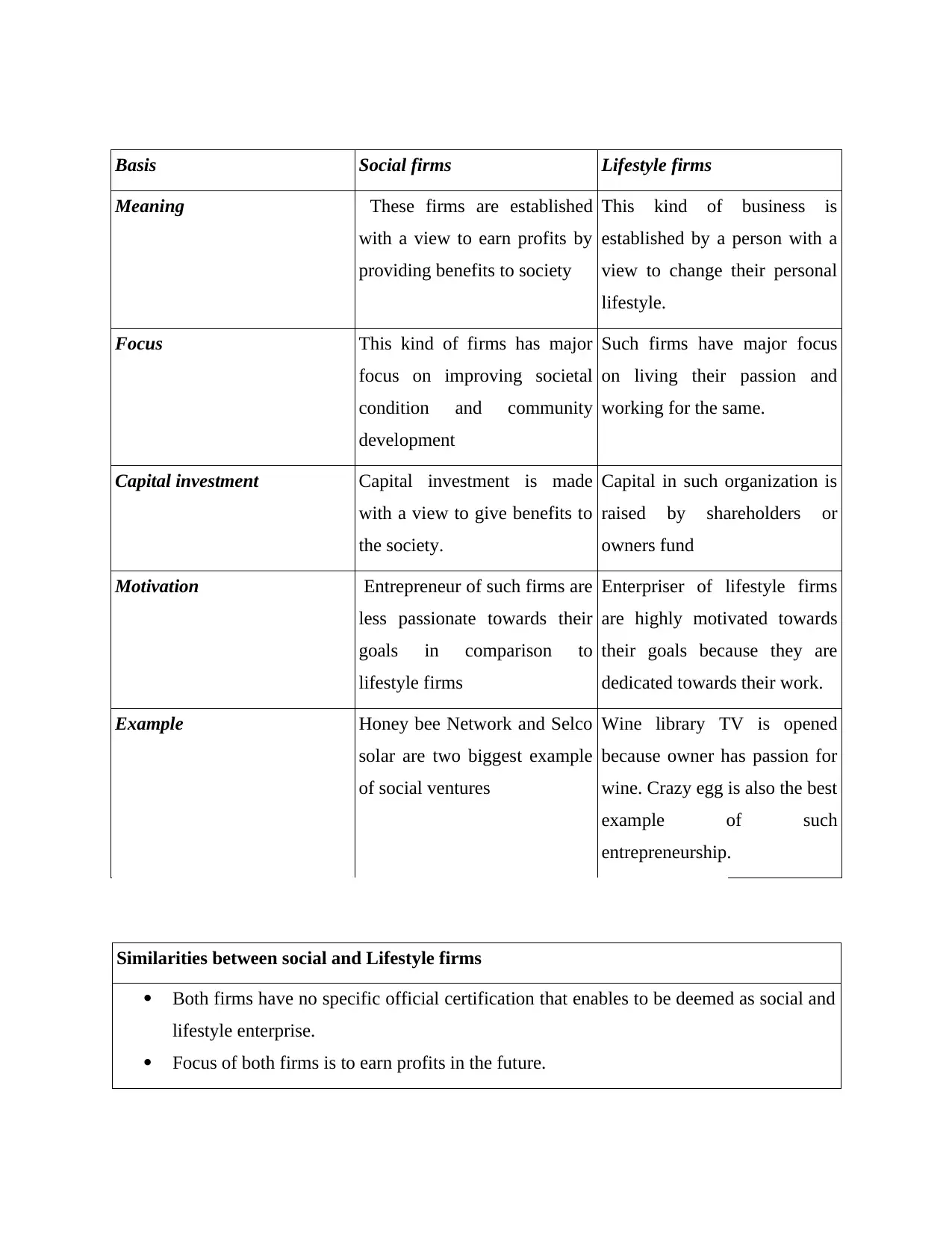
Basis Social firms Lifestyle firms
Meaning These firms are established
with a view to earn profits by
providing benefits to society
This kind of business is
established by a person with a
view to change their personal
lifestyle.
Focus This kind of firms has major
focus on improving societal
condition and community
development
Such firms have major focus
on living their passion and
working for the same.
Capital investment Capital investment is made
with a view to give benefits to
the society.
Capital in such organization is
raised by shareholders or
owners fund
Motivation Entrepreneur of such firms are
less passionate towards their
goals in comparison to
lifestyle firms
Enterpriser of lifestyle firms
are highly motivated towards
their goals because they are
dedicated towards their work.
Example Honey bee Network and Selco
solar are two biggest example
of social ventures
Wine library TV is opened
because owner has passion for
wine. Crazy egg is also the best
example of such
entrepreneurship.
Similarities between social and Lifestyle firms
Both firms have no specific official certification that enables to be deemed as social and
lifestyle enterprise.
Focus of both firms is to earn profits in the future.
Meaning These firms are established
with a view to earn profits by
providing benefits to society
This kind of business is
established by a person with a
view to change their personal
lifestyle.
Focus This kind of firms has major
focus on improving societal
condition and community
development
Such firms have major focus
on living their passion and
working for the same.
Capital investment Capital investment is made
with a view to give benefits to
the society.
Capital in such organization is
raised by shareholders or
owners fund
Motivation Entrepreneur of such firms are
less passionate towards their
goals in comparison to
lifestyle firms
Enterpriser of lifestyle firms
are highly motivated towards
their goals because they are
dedicated towards their work.
Example Honey bee Network and Selco
solar are two biggest example
of social ventures
Wine library TV is opened
because owner has passion for
wine. Crazy egg is also the best
example of such
entrepreneurship.
Similarities between social and Lifestyle firms
Both firms have no specific official certification that enables to be deemed as social and
lifestyle enterprise.
Focus of both firms is to earn profits in the future.
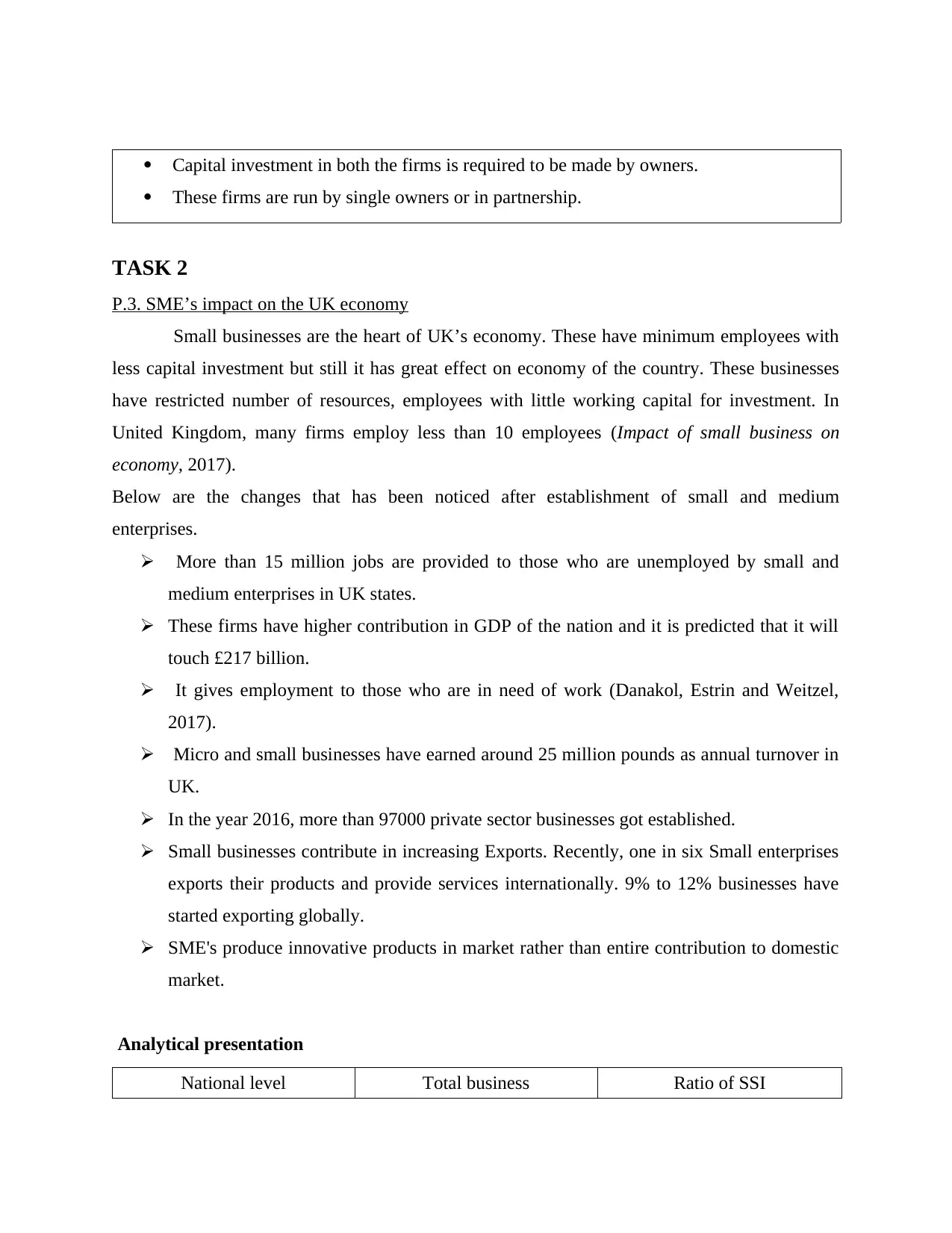
Capital investment in both the firms is required to be made by owners.
These firms are run by single owners or in partnership.
TASK 2
P.3. SME’s impact on the UK economy
Small businesses are the heart of UK’s economy. These have minimum employees with
less capital investment but still it has great effect on economy of the country. These businesses
have restricted number of resources, employees with little working capital for investment. In
United Kingdom, many firms employ less than 10 employees (Impact of small business on
economy, 2017).
Below are the changes that has been noticed after establishment of small and medium
enterprises.
More than 15 million jobs are provided to those who are unemployed by small and
medium enterprises in UK states.
These firms have higher contribution in GDP of the nation and it is predicted that it will
touch £217 billion.
It gives employment to those who are in need of work (Danakol, Estrin and Weitzel,
2017).
Micro and small businesses have earned around 25 million pounds as annual turnover in
UK.
In the year 2016, more than 97000 private sector businesses got established.
Small businesses contribute in increasing Exports. Recently, one in six Small enterprises
exports their products and provide services internationally. 9% to 12% businesses have
started exporting globally.
SME's produce innovative products in market rather than entire contribution to domestic
market.
Analytical presentation
National level Total business Ratio of SSI
These firms are run by single owners or in partnership.
TASK 2
P.3. SME’s impact on the UK economy
Small businesses are the heart of UK’s economy. These have minimum employees with
less capital investment but still it has great effect on economy of the country. These businesses
have restricted number of resources, employees with little working capital for investment. In
United Kingdom, many firms employ less than 10 employees (Impact of small business on
economy, 2017).
Below are the changes that has been noticed after establishment of small and medium
enterprises.
More than 15 million jobs are provided to those who are unemployed by small and
medium enterprises in UK states.
These firms have higher contribution in GDP of the nation and it is predicted that it will
touch £217 billion.
It gives employment to those who are in need of work (Danakol, Estrin and Weitzel,
2017).
Micro and small businesses have earned around 25 million pounds as annual turnover in
UK.
In the year 2016, more than 97000 private sector businesses got established.
Small businesses contribute in increasing Exports. Recently, one in six Small enterprises
exports their products and provide services internationally. 9% to 12% businesses have
started exporting globally.
SME's produce innovative products in market rather than entire contribution to domestic
market.
Analytical presentation
National level Total business Ratio of SSI
Paraphrase This Document
Need a fresh take? Get an instant paraphrase of this document with our AI Paraphraser
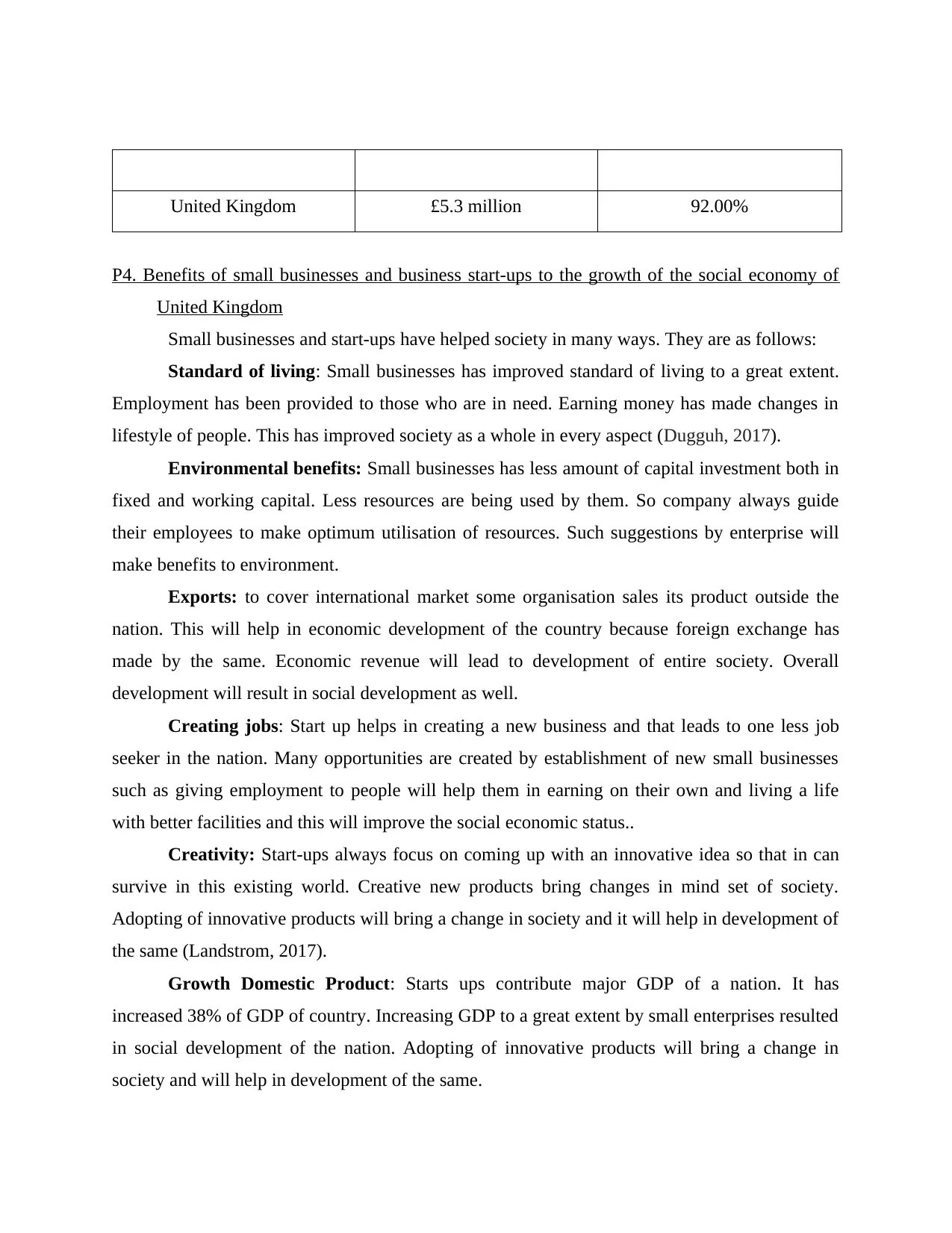
United Kingdom £5.3 million 92.00%
P4. Benefits of small businesses and business start-ups to the growth of the social economy of
United Kingdom
Small businesses and start-ups have helped society in many ways. They are as follows:
Standard of living: Small businesses has improved standard of living to a great extent.
Employment has been provided to those who are in need. Earning money has made changes in
lifestyle of people. This has improved society as a whole in every aspect (Dugguh, 2017).
Environmental benefits: Small businesses has less amount of capital investment both in
fixed and working capital. Less resources are being used by them. So company always guide
their employees to make optimum utilisation of resources. Such suggestions by enterprise will
make benefits to environment.
Exports: to cover international market some organisation sales its product outside the
nation. This will help in economic development of the country because foreign exchange has
made by the same. Economic revenue will lead to development of entire society. Overall
development will result in social development as well.
Creating jobs: Start up helps in creating a new business and that leads to one less job
seeker in the nation. Many opportunities are created by establishment of new small businesses
such as giving employment to people will help them in earning on their own and living a life
with better facilities and this will improve the social economic status..
Creativity: Start-ups always focus on coming up with an innovative idea so that in can
survive in this existing world. Creative new products bring changes in mind set of society.
Adopting of innovative products will bring a change in society and it will help in development of
the same (Landstrom, 2017).
Growth Domestic Product: Starts ups contribute major GDP of a nation. It has
increased 38% of GDP of country. Increasing GDP to a great extent by small enterprises resulted
in social development of the nation. Adopting of innovative products will bring a change in
society and will help in development of the same.
P4. Benefits of small businesses and business start-ups to the growth of the social economy of
United Kingdom
Small businesses and start-ups have helped society in many ways. They are as follows:
Standard of living: Small businesses has improved standard of living to a great extent.
Employment has been provided to those who are in need. Earning money has made changes in
lifestyle of people. This has improved society as a whole in every aspect (Dugguh, 2017).
Environmental benefits: Small businesses has less amount of capital investment both in
fixed and working capital. Less resources are being used by them. So company always guide
their employees to make optimum utilisation of resources. Such suggestions by enterprise will
make benefits to environment.
Exports: to cover international market some organisation sales its product outside the
nation. This will help in economic development of the country because foreign exchange has
made by the same. Economic revenue will lead to development of entire society. Overall
development will result in social development as well.
Creating jobs: Start up helps in creating a new business and that leads to one less job
seeker in the nation. Many opportunities are created by establishment of new small businesses
such as giving employment to people will help them in earning on their own and living a life
with better facilities and this will improve the social economic status..
Creativity: Start-ups always focus on coming up with an innovative idea so that in can
survive in this existing world. Creative new products bring changes in mind set of society.
Adopting of innovative products will bring a change in society and it will help in development of
the same (Landstrom, 2017).
Growth Domestic Product: Starts ups contribute major GDP of a nation. It has
increased 38% of GDP of country. Increasing GDP to a great extent by small enterprises resulted
in social development of the nation. Adopting of innovative products will bring a change in
society and will help in development of the same.
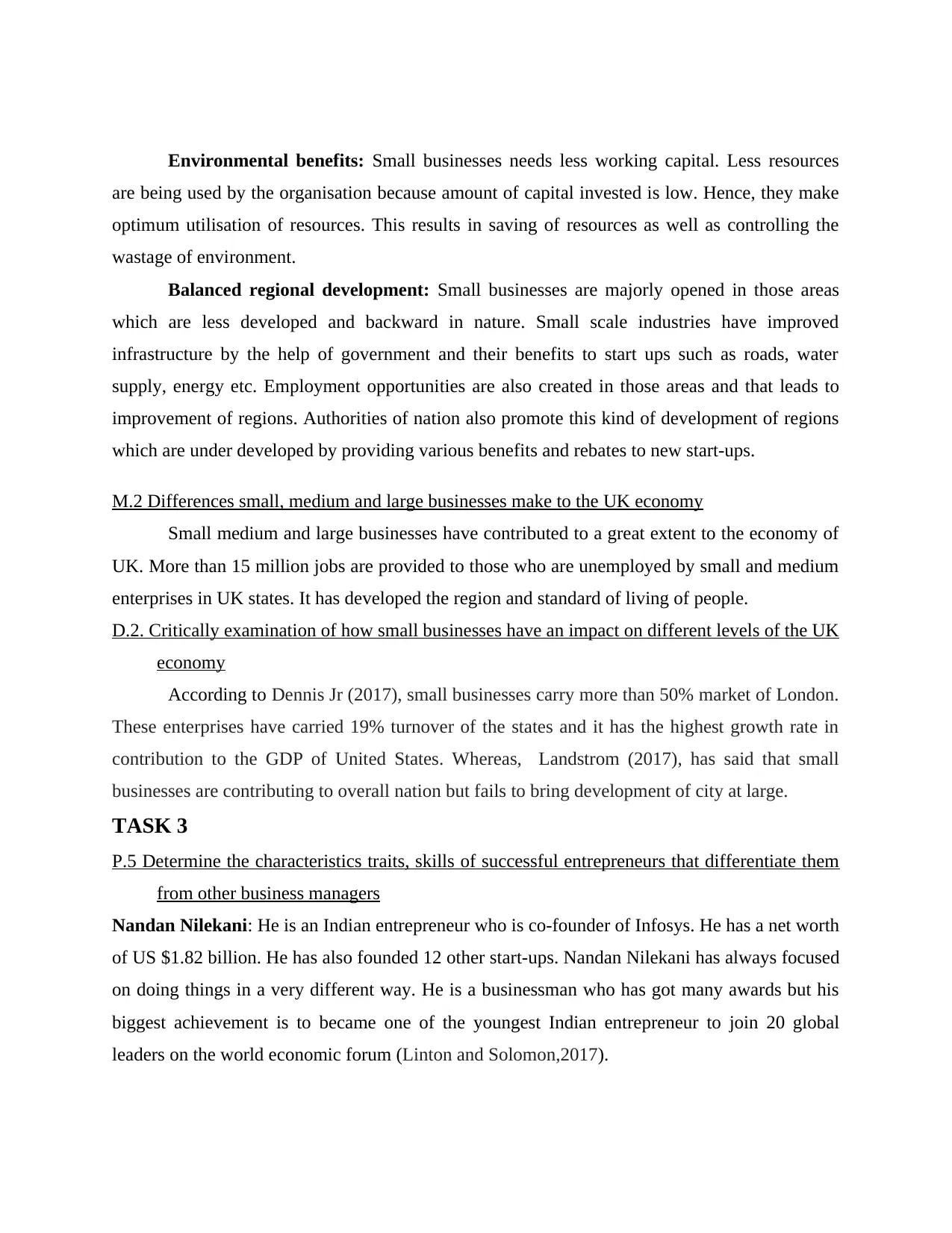
Environmental benefits: Small businesses needs less working capital. Less resources
are being used by the organisation because amount of capital invested is low. Hence, they make
optimum utilisation of resources. This results in saving of resources as well as controlling the
wastage of environment.
Balanced regional development: Small businesses are majorly opened in those areas
which are less developed and backward in nature. Small scale industries have improved
infrastructure by the help of government and their benefits to start ups such as roads, water
supply, energy etc. Employment opportunities are also created in those areas and that leads to
improvement of regions. Authorities of nation also promote this kind of development of regions
which are under developed by providing various benefits and rebates to new start-ups.
M.2 Differences small, medium and large businesses make to the UK economy
Small medium and large businesses have contributed to a great extent to the economy of
UK. More than 15 million jobs are provided to those who are unemployed by small and medium
enterprises in UK states. It has developed the region and standard of living of people.
D.2. Critically examination of how small businesses have an impact on different levels of the UK
economy
According to Dennis Jr (2017), small businesses carry more than 50% market of London.
These enterprises have carried 19% turnover of the states and it has the highest growth rate in
contribution to the GDP of United States. Whereas, Landstrom (2017), has said that small
businesses are contributing to overall nation but fails to bring development of city at large.
TASK 3
P.5 Determine the characteristics traits, skills of successful entrepreneurs that differentiate them
from other business managers
Nandan Nilekani: He is an Indian entrepreneur who is co-founder of Infosys. He has a net worth
of US $1.82 billion. He has also founded 12 other start-ups. Nandan Nilekani has always focused
on doing things in a very different way. He is a businessman who has got many awards but his
biggest achievement is to became one of the youngest Indian entrepreneur to join 20 global
leaders on the world economic forum (Linton and Solomon,2017).
are being used by the organisation because amount of capital invested is low. Hence, they make
optimum utilisation of resources. This results in saving of resources as well as controlling the
wastage of environment.
Balanced regional development: Small businesses are majorly opened in those areas
which are less developed and backward in nature. Small scale industries have improved
infrastructure by the help of government and their benefits to start ups such as roads, water
supply, energy etc. Employment opportunities are also created in those areas and that leads to
improvement of regions. Authorities of nation also promote this kind of development of regions
which are under developed by providing various benefits and rebates to new start-ups.
M.2 Differences small, medium and large businesses make to the UK economy
Small medium and large businesses have contributed to a great extent to the economy of
UK. More than 15 million jobs are provided to those who are unemployed by small and medium
enterprises in UK states. It has developed the region and standard of living of people.
D.2. Critically examination of how small businesses have an impact on different levels of the UK
economy
According to Dennis Jr (2017), small businesses carry more than 50% market of London.
These enterprises have carried 19% turnover of the states and it has the highest growth rate in
contribution to the GDP of United States. Whereas, Landstrom (2017), has said that small
businesses are contributing to overall nation but fails to bring development of city at large.
TASK 3
P.5 Determine the characteristics traits, skills of successful entrepreneurs that differentiate them
from other business managers
Nandan Nilekani: He is an Indian entrepreneur who is co-founder of Infosys. He has a net worth
of US $1.82 billion. He has also founded 12 other start-ups. Nandan Nilekani has always focused
on doing things in a very different way. He is a businessman who has got many awards but his
biggest achievement is to became one of the youngest Indian entrepreneur to join 20 global
leaders on the world economic forum (Linton and Solomon,2017).
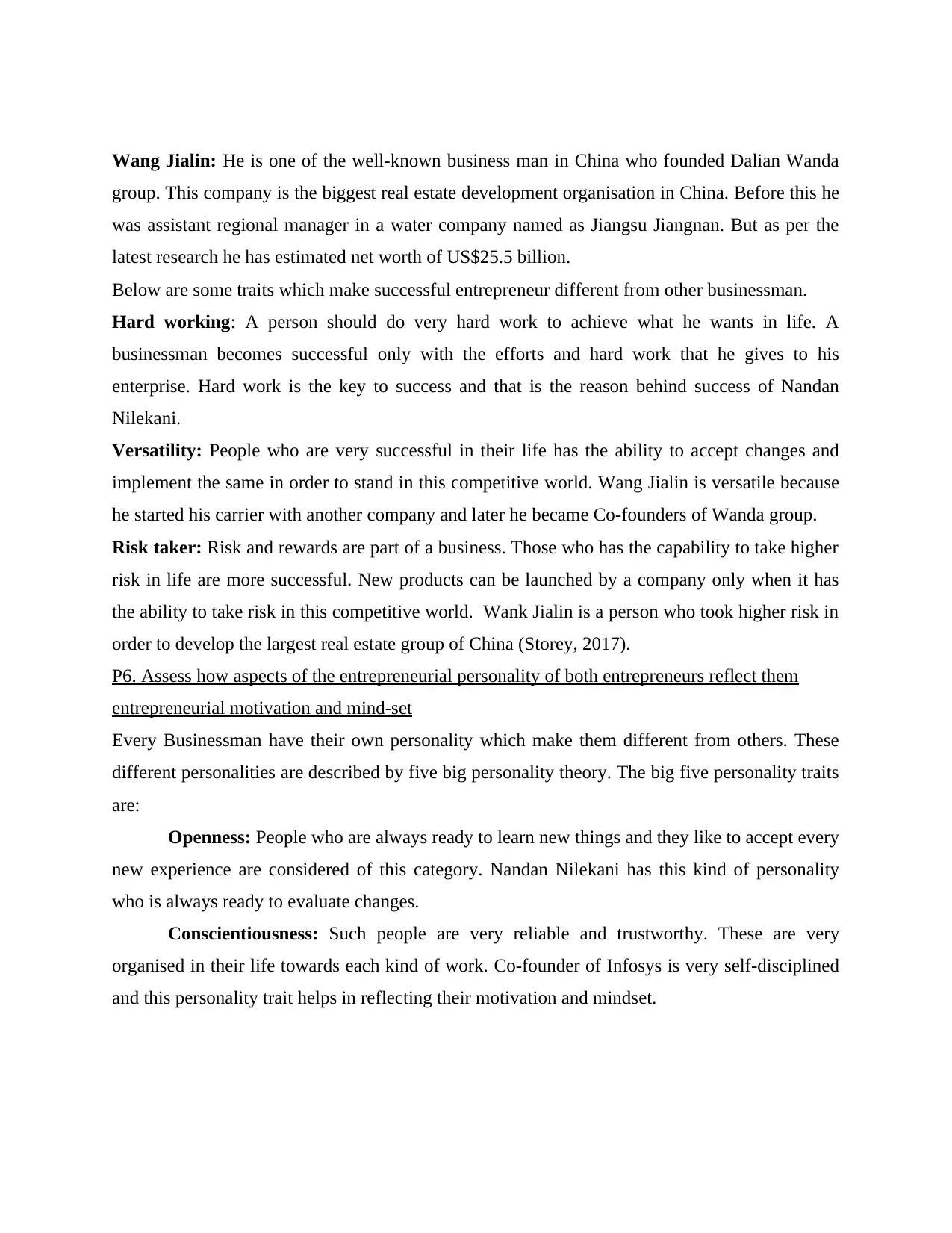
Wang Jialin: He is one of the well-known business man in China who founded Dalian Wanda
group. This company is the biggest real estate development organisation in China. Before this he
was assistant regional manager in a water company named as Jiangsu Jiangnan. But as per the
latest research he has estimated net worth of US$25.5 billion.
Below are some traits which make successful entrepreneur different from other businessman.
Hard working: A person should do very hard work to achieve what he wants in life. A
businessman becomes successful only with the efforts and hard work that he gives to his
enterprise. Hard work is the key to success and that is the reason behind success of Nandan
Nilekani.
Versatility: People who are very successful in their life has the ability to accept changes and
implement the same in order to stand in this competitive world. Wang Jialin is versatile because
he started his carrier with another company and later he became Co-founders of Wanda group.
Risk taker: Risk and rewards are part of a business. Those who has the capability to take higher
risk in life are more successful. New products can be launched by a company only when it has
the ability to take risk in this competitive world. Wank Jialin is a person who took higher risk in
order to develop the largest real estate group of China (Storey, 2017).
P6. Assess how aspects of the entrepreneurial personality of both entrepreneurs reflect them
entrepreneurial motivation and mind-set
Every Businessman have their own personality which make them different from others. These
different personalities are described by five big personality theory. The big five personality traits
are:
Openness: People who are always ready to learn new things and they like to accept every
new experience are considered of this category. Nandan Nilekani has this kind of personality
who is always ready to evaluate changes.
Conscientiousness: Such people are very reliable and trustworthy. These are very
organised in their life towards each kind of work. Co-founder of Infosys is very self-disciplined
and this personality trait helps in reflecting their motivation and mindset.
group. This company is the biggest real estate development organisation in China. Before this he
was assistant regional manager in a water company named as Jiangsu Jiangnan. But as per the
latest research he has estimated net worth of US$25.5 billion.
Below are some traits which make successful entrepreneur different from other businessman.
Hard working: A person should do very hard work to achieve what he wants in life. A
businessman becomes successful only with the efforts and hard work that he gives to his
enterprise. Hard work is the key to success and that is the reason behind success of Nandan
Nilekani.
Versatility: People who are very successful in their life has the ability to accept changes and
implement the same in order to stand in this competitive world. Wang Jialin is versatile because
he started his carrier with another company and later he became Co-founders of Wanda group.
Risk taker: Risk and rewards are part of a business. Those who has the capability to take higher
risk in life are more successful. New products can be launched by a company only when it has
the ability to take risk in this competitive world. Wank Jialin is a person who took higher risk in
order to develop the largest real estate group of China (Storey, 2017).
P6. Assess how aspects of the entrepreneurial personality of both entrepreneurs reflect them
entrepreneurial motivation and mind-set
Every Businessman have their own personality which make them different from others. These
different personalities are described by five big personality theory. The big five personality traits
are:
Openness: People who are always ready to learn new things and they like to accept every
new experience are considered of this category. Nandan Nilekani has this kind of personality
who is always ready to evaluate changes.
Conscientiousness: Such people are very reliable and trustworthy. These are very
organised in their life towards each kind of work. Co-founder of Infosys is very self-disciplined
and this personality trait helps in reflecting their motivation and mindset.
Secure Best Marks with AI Grader
Need help grading? Try our AI Grader for instant feedback on your assignments.
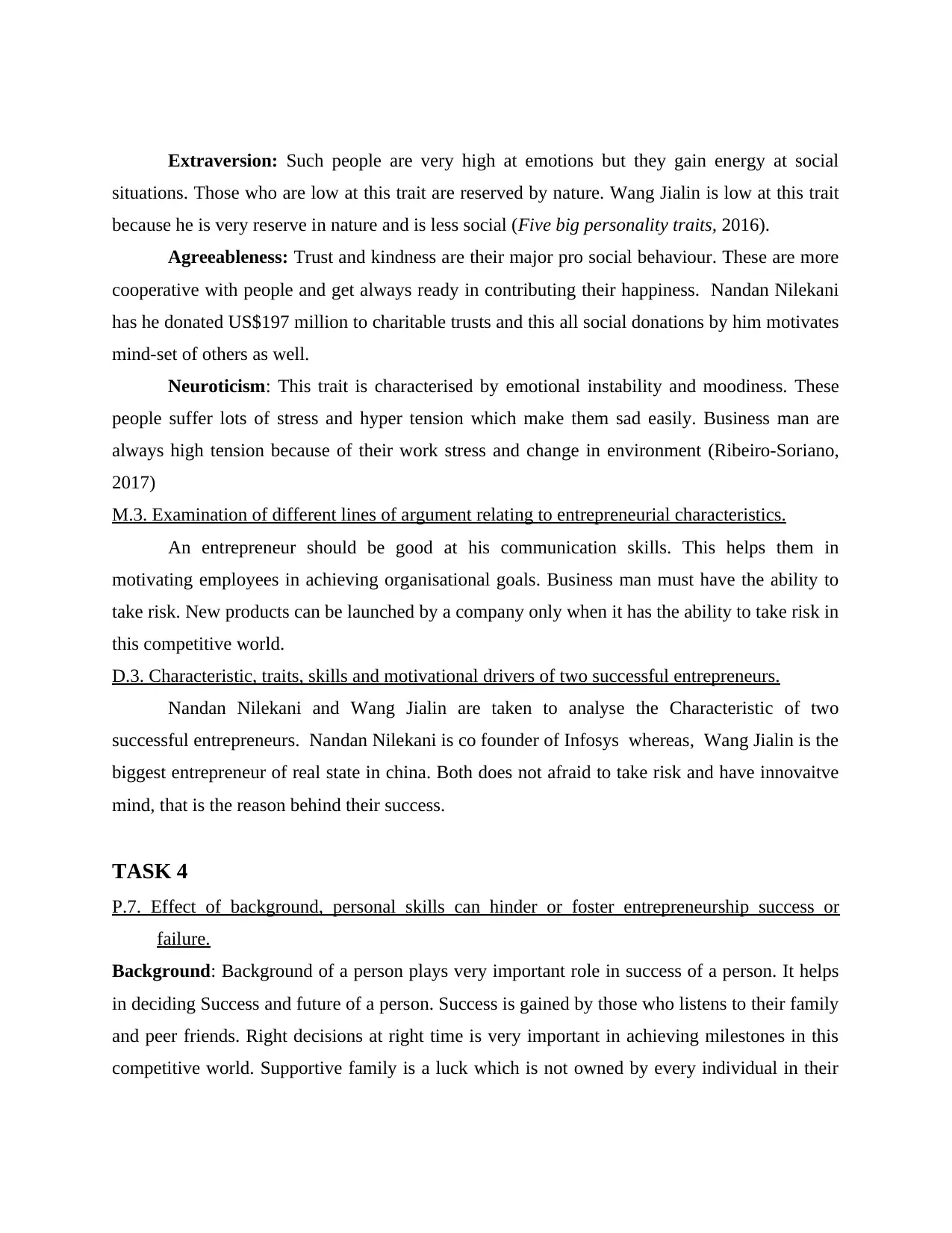
Extraversion: Such people are very high at emotions but they gain energy at social
situations. Those who are low at this trait are reserved by nature. Wang Jialin is low at this trait
because he is very reserve in nature and is less social (Five big personality traits, 2016).
Agreeableness: Trust and kindness are their major pro social behaviour. These are more
cooperative with people and get always ready in contributing their happiness. Nandan Nilekani
has he donated US$197 million to charitable trusts and this all social donations by him motivates
mind-set of others as well.
Neuroticism: This trait is characterised by emotional instability and moodiness. These
people suffer lots of stress and hyper tension which make them sad easily. Business man are
always high tension because of their work stress and change in environment (Ribeiro-Soriano,
2017)
M.3. Examination of different lines of argument relating to entrepreneurial characteristics.
An entrepreneur should be good at his communication skills. This helps them in
motivating employees in achieving organisational goals. Business man must have the ability to
take risk. New products can be launched by a company only when it has the ability to take risk in
this competitive world.
D.3. Characteristic, traits, skills and motivational drivers of two successful entrepreneurs.
Nandan Nilekani and Wang Jialin are taken to analyse the Characteristic of two
successful entrepreneurs. Nandan Nilekani is co founder of Infosys whereas, Wang Jialin is the
biggest entrepreneur of real state in china. Both does not afraid to take risk and have innovaitve
mind, that is the reason behind their success.
TASK 4
P.7. Effect of background, personal skills can hinder or foster entrepreneurship success or
failure.
Background: Background of a person plays very important role in success of a person. It helps
in deciding Success and future of a person. Success is gained by those who listens to their family
and peer friends. Right decisions at right time is very important in achieving milestones in this
competitive world. Supportive family is a luck which is not owned by every individual in their
situations. Those who are low at this trait are reserved by nature. Wang Jialin is low at this trait
because he is very reserve in nature and is less social (Five big personality traits, 2016).
Agreeableness: Trust and kindness are their major pro social behaviour. These are more
cooperative with people and get always ready in contributing their happiness. Nandan Nilekani
has he donated US$197 million to charitable trusts and this all social donations by him motivates
mind-set of others as well.
Neuroticism: This trait is characterised by emotional instability and moodiness. These
people suffer lots of stress and hyper tension which make them sad easily. Business man are
always high tension because of their work stress and change in environment (Ribeiro-Soriano,
2017)
M.3. Examination of different lines of argument relating to entrepreneurial characteristics.
An entrepreneur should be good at his communication skills. This helps them in
motivating employees in achieving organisational goals. Business man must have the ability to
take risk. New products can be launched by a company only when it has the ability to take risk in
this competitive world.
D.3. Characteristic, traits, skills and motivational drivers of two successful entrepreneurs.
Nandan Nilekani and Wang Jialin are taken to analyse the Characteristic of two
successful entrepreneurs. Nandan Nilekani is co founder of Infosys whereas, Wang Jialin is the
biggest entrepreneur of real state in china. Both does not afraid to take risk and have innovaitve
mind, that is the reason behind their success.
TASK 4
P.7. Effect of background, personal skills can hinder or foster entrepreneurship success or
failure.
Background: Background of a person plays very important role in success of a person. It helps
in deciding Success and future of a person. Success is gained by those who listens to their family
and peer friends. Right decisions at right time is very important in achieving milestones in this
competitive world. Supportive family is a luck which is not owned by every individual in their
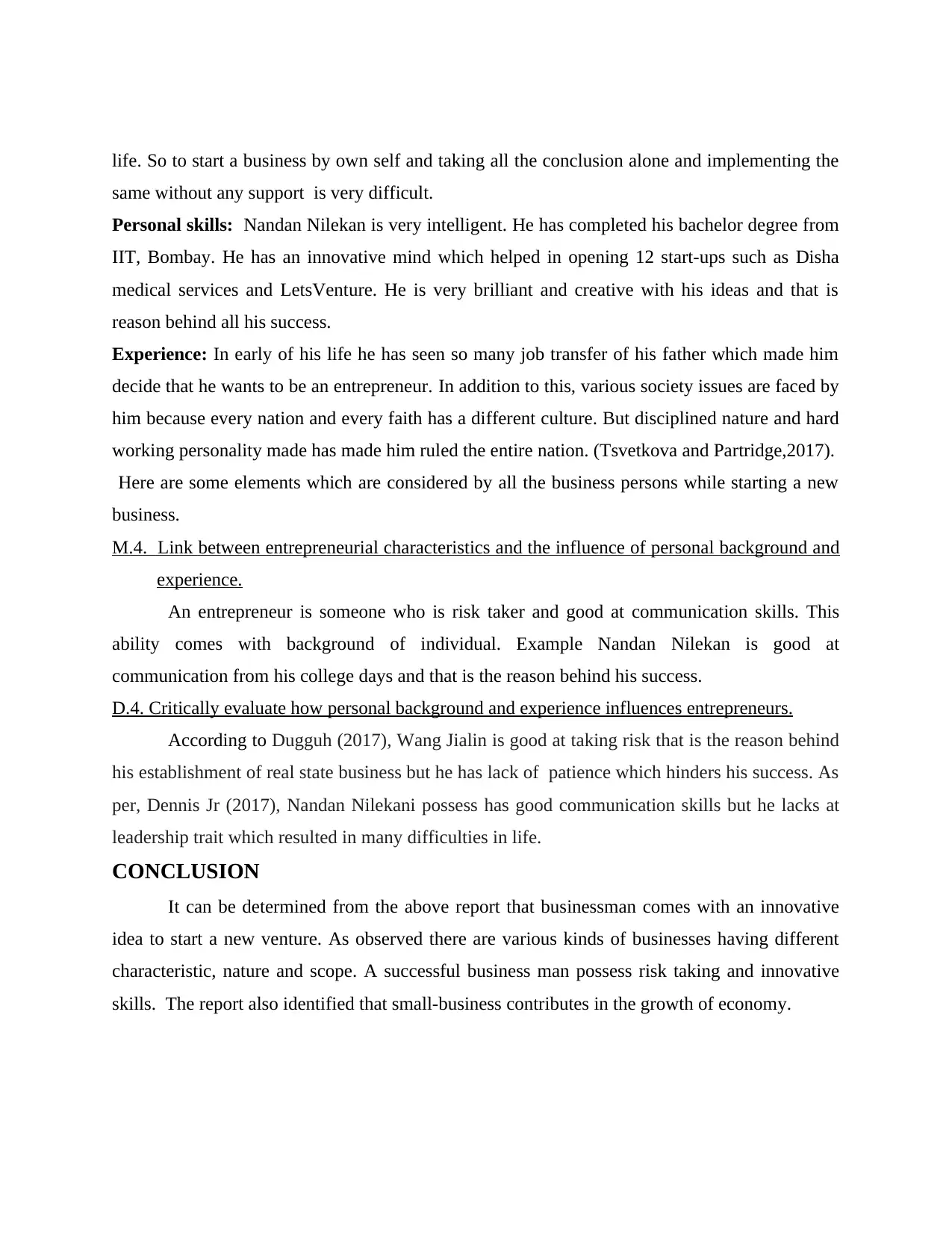
life. So to start a business by own self and taking all the conclusion alone and implementing the
same without any support is very difficult.
Personal skills: Nandan Nilekan is very intelligent. He has completed his bachelor degree from
IIT, Bombay. He has an innovative mind which helped in opening 12 start-ups such as Disha
medical services and LetsVenture. He is very brilliant and creative with his ideas and that is
reason behind all his success.
Experience: In early of his life he has seen so many job transfer of his father which made him
decide that he wants to be an entrepreneur. In addition to this, various society issues are faced by
him because every nation and every faith has a different culture. But disciplined nature and hard
working personality made has made him ruled the entire nation. (Tsvetkova and Partridge,2017).
Here are some elements which are considered by all the business persons while starting a new
business.
M.4. Link between entrepreneurial characteristics and the influence of personal background and
experience.
An entrepreneur is someone who is risk taker and good at communication skills. This
ability comes with background of individual. Example Nandan Nilekan is good at
communication from his college days and that is the reason behind his success.
D.4. Critically evaluate how personal background and experience influences entrepreneurs.
According to Dugguh (2017), Wang Jialin is good at taking risk that is the reason behind
his establishment of real state business but he has lack of patience which hinders his success. As
per, Dennis Jr (2017), Nandan Nilekani possess has good communication skills but he lacks at
leadership trait which resulted in many difficulties in life.
CONCLUSION
It can be determined from the above report that businessman comes with an innovative
idea to start a new venture. As observed there are various kinds of businesses having different
characteristic, nature and scope. A successful business man possess risk taking and innovative
skills. The report also identified that small-business contributes in the growth of economy.
same without any support is very difficult.
Personal skills: Nandan Nilekan is very intelligent. He has completed his bachelor degree from
IIT, Bombay. He has an innovative mind which helped in opening 12 start-ups such as Disha
medical services and LetsVenture. He is very brilliant and creative with his ideas and that is
reason behind all his success.
Experience: In early of his life he has seen so many job transfer of his father which made him
decide that he wants to be an entrepreneur. In addition to this, various society issues are faced by
him because every nation and every faith has a different culture. But disciplined nature and hard
working personality made has made him ruled the entire nation. (Tsvetkova and Partridge,2017).
Here are some elements which are considered by all the business persons while starting a new
business.
M.4. Link between entrepreneurial characteristics and the influence of personal background and
experience.
An entrepreneur is someone who is risk taker and good at communication skills. This
ability comes with background of individual. Example Nandan Nilekan is good at
communication from his college days and that is the reason behind his success.
D.4. Critically evaluate how personal background and experience influences entrepreneurs.
According to Dugguh (2017), Wang Jialin is good at taking risk that is the reason behind
his establishment of real state business but he has lack of patience which hinders his success. As
per, Dennis Jr (2017), Nandan Nilekani possess has good communication skills but he lacks at
leadership trait which resulted in many difficulties in life.
CONCLUSION
It can be determined from the above report that businessman comes with an innovative
idea to start a new venture. As observed there are various kinds of businesses having different
characteristic, nature and scope. A successful business man possess risk taking and innovative
skills. The report also identified that small-business contributes in the growth of economy.

Paraphrase This Document
Need a fresh take? Get an instant paraphrase of this document with our AI Paraphraser
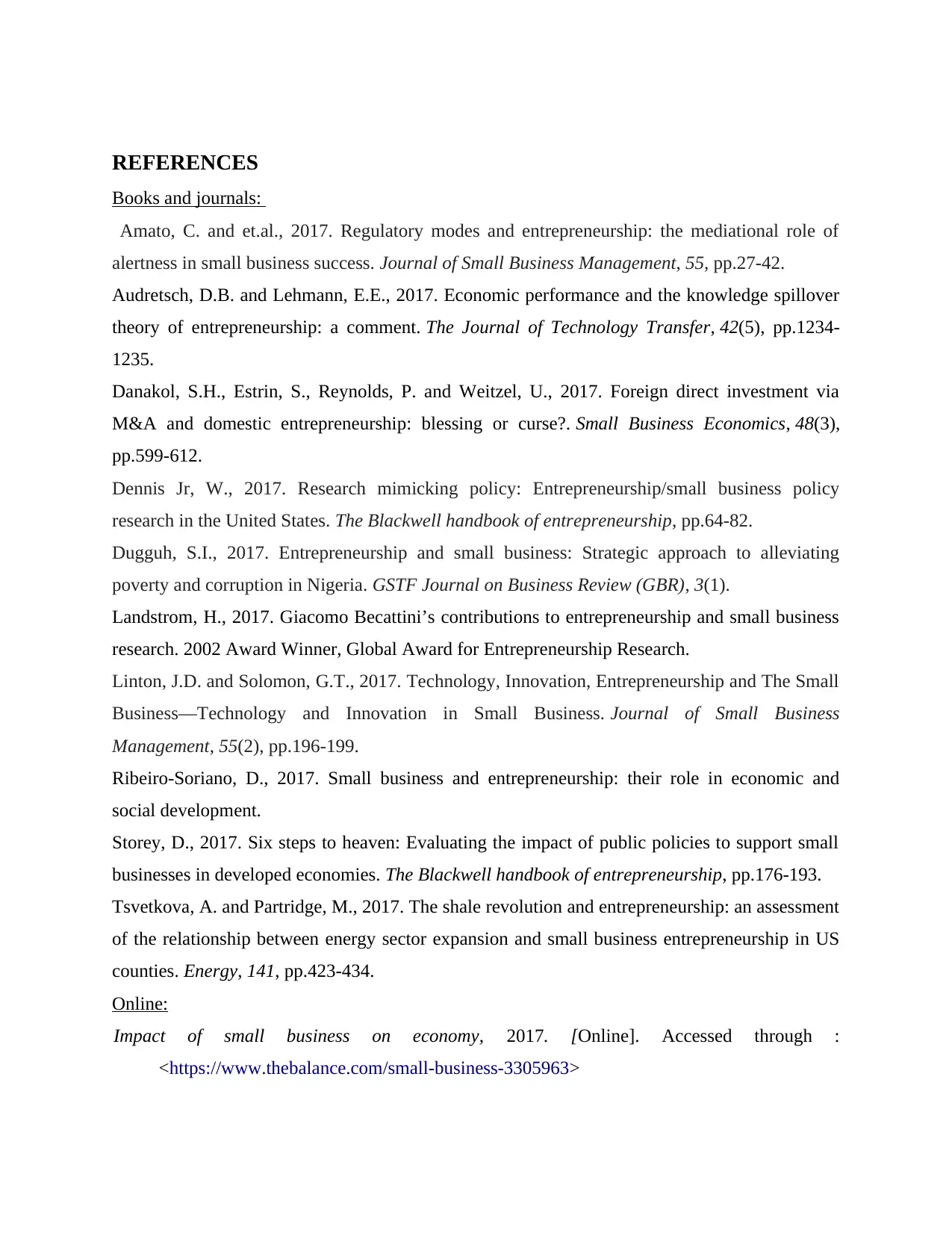
REFERENCES
Books and journals:
Amato, C. and et.al., 2017. Regulatory modes and entrepreneurship: the mediational role of
alertness in small business success. Journal of Small Business Management, 55, pp.27-42.
Audretsch, D.B. and Lehmann, E.E., 2017. Economic performance and the knowledge spillover
theory of entrepreneurship: a comment. The Journal of Technology Transfer, 42(5), pp.1234-
1235.
Danakol, S.H., Estrin, S., Reynolds, P. and Weitzel, U., 2017. Foreign direct investment via
M&A and domestic entrepreneurship: blessing or curse?. Small Business Economics, 48(3),
pp.599-612.
Dennis Jr, W., 2017. Research mimicking policy: Entrepreneurship/small business policy
research in the United States. The Blackwell handbook of entrepreneurship, pp.64-82.
Dugguh, S.I., 2017. Entrepreneurship and small business: Strategic approach to alleviating
poverty and corruption in Nigeria. GSTF Journal on Business Review (GBR), 3(1).
Landstrom, H., 2017. Giacomo Becattini’s contributions to entrepreneurship and small business
research. 2002 Award Winner, Global Award for Entrepreneurship Research.
Linton, J.D. and Solomon, G.T., 2017. Technology, Innovation, Entrepreneurship and The Small
Business—Technology and Innovation in Small Business. Journal of Small Business
Management, 55(2), pp.196-199.
Ribeiro-Soriano, D., 2017. Small business and entrepreneurship: their role in economic and
social development.
Storey, D., 2017. Six steps to heaven: Evaluating the impact of public policies to support small
businesses in developed economies. The Blackwell handbook of entrepreneurship, pp.176-193.
Tsvetkova, A. and Partridge, M., 2017. The shale revolution and entrepreneurship: an assessment
of the relationship between energy sector expansion and small business entrepreneurship in US
counties. Energy, 141, pp.423-434.
Online:
Impact of small business on economy, 2017. [Online]. Accessed through :
<https://www.thebalance.com/small-business-3305963>
Books and journals:
Amato, C. and et.al., 2017. Regulatory modes and entrepreneurship: the mediational role of
alertness in small business success. Journal of Small Business Management, 55, pp.27-42.
Audretsch, D.B. and Lehmann, E.E., 2017. Economic performance and the knowledge spillover
theory of entrepreneurship: a comment. The Journal of Technology Transfer, 42(5), pp.1234-
1235.
Danakol, S.H., Estrin, S., Reynolds, P. and Weitzel, U., 2017. Foreign direct investment via
M&A and domestic entrepreneurship: blessing or curse?. Small Business Economics, 48(3),
pp.599-612.
Dennis Jr, W., 2017. Research mimicking policy: Entrepreneurship/small business policy
research in the United States. The Blackwell handbook of entrepreneurship, pp.64-82.
Dugguh, S.I., 2017. Entrepreneurship and small business: Strategic approach to alleviating
poverty and corruption in Nigeria. GSTF Journal on Business Review (GBR), 3(1).
Landstrom, H., 2017. Giacomo Becattini’s contributions to entrepreneurship and small business
research. 2002 Award Winner, Global Award for Entrepreneurship Research.
Linton, J.D. and Solomon, G.T., 2017. Technology, Innovation, Entrepreneurship and The Small
Business—Technology and Innovation in Small Business. Journal of Small Business
Management, 55(2), pp.196-199.
Ribeiro-Soriano, D., 2017. Small business and entrepreneurship: their role in economic and
social development.
Storey, D., 2017. Six steps to heaven: Evaluating the impact of public policies to support small
businesses in developed economies. The Blackwell handbook of entrepreneurship, pp.176-193.
Tsvetkova, A. and Partridge, M., 2017. The shale revolution and entrepreneurship: an assessment
of the relationship between energy sector expansion and small business entrepreneurship in US
counties. Energy, 141, pp.423-434.
Online:
Impact of small business on economy, 2017. [Online]. Accessed through :
<https://www.thebalance.com/small-business-3305963>
1 out of 14
Related Documents
Your All-in-One AI-Powered Toolkit for Academic Success.
+13062052269
info@desklib.com
Available 24*7 on WhatsApp / Email
![[object Object]](/_next/static/media/star-bottom.7253800d.svg)
Unlock your academic potential
© 2024 | Zucol Services PVT LTD | All rights reserved.





